With my departure from Korea around the corner, I realize I haven't written quite as much about my life here as I had originally hoped. It seems strange that I could churn out an entry a day when I was working a desk-job in Sydney, but while living abroad and dealing with new challenges everyday - I have sometimes gone weeks without a post.

One of Korea's signature snacks - gimbap. Rice, seaweed, pickle, cheese, and spam. Cheap and fairly healthy.
In an effort to curb that, and to support Hannah DeMilita in her own quest for thirty straight days of posts, I'm going to put up seven posts in seven days detailing some facet of Korean life that I've found fascinating, frustrating, fantastic, or just downright weird.
For my first treatise on the wonders and weirdness of Korea, I've chosen to write about the mind blowing array of street food. So, without further ado...
Street Food in South Korea
Seldom a drunken night in Korea passes with a visit to some kind of street vendor. When the bakeries and galbi joints have closed, sometimes your best option is something suspicious looking being hawked from the back of a trailer by a man or woman whose hygiene standards don't quite match up to what you'd find in a Western country. The snootier travel guides will tell you not to risk a case of 'Delhi Belly' by sampling these delights, but it's not living if you're not willing to chance an hour or two grunting atop the toilet in the name of new experiences. And FYI, I've never once had a nasty reaction to street food eaten in Korea.
The vast majority of street food in Korea tends towards being fried and/or being meat. That's not to say vegetarians are completely out of luck, but it is definitely a carnivore's market when it comes to street peddlers. You can sink your teeth into everything from chicken or beef, to stranger things such as silkworm larvae and man's best friend. There's various fruits on sticks, peanut stuffed pancakes, waffles, and even shaved ice topped with bean paste and fruit for the sweet tooth as well as piping hot cups of fishy water for cold mornings.
On a Stick...

Kimberly enjoys her first ever potato tornado (with powdered cheese) at the 2011 Jinhae Cherry Blossom Festival
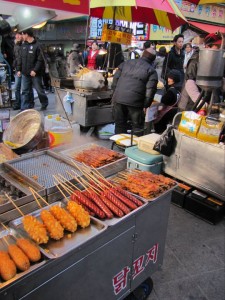
Sausages and corn-dogs? Oh my!

My cute little brother enjoying some pineapple on a stick in April 2008.
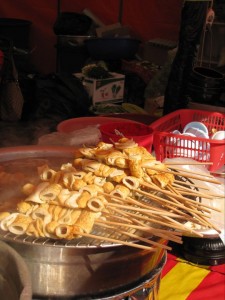
Odeng. Processed fish meat on a stick.
One of the more culinary delights on offer in Korea comes in the form of various foodstuffs on a stick. In summer you'll be able to find various tropical fruits on sticks, but all year round there's a variety of meaty snacks on the menu. I've long been a fan of chicken on a stick - lightly marinated pieces of chicken breast skewered and cooked on a grill. I've occasionally found myself suspicious that mine wasn't cooked all the way through, but when you're paying 1000 won (less than $1), it's really no big deal to throw it away if you don't want to risk a nasty case of salmonella.
Other options 'on a stick' include various kinds of sausage, corn dogs (or Pluto Pups to the Aussies), potato tornadoes (see below), odeng (heavily processed fish that is then soaked in its own juices), and toffee apples. I've not had much experience with the sausage, but the corn dogs are good once you get through the obscene amount of dough on them. Potato tomatoes are amazing and odeng, whilst not particularly flavorful, is often served with a cup of the piping hot water that it is soaked in. It might not sound appealing, but on an icy night in a country without much in the way of good tea, it's going to be your best friend as you shiver by the stand and question the sanity of your move to a country that sees regular snow.
Classier Cuisine?
'On a stick' doesn't really conjure up images of fine food, but there's plenty of other options available to the discerning Korean snack buyer. Many pizza stores sell their pizza by the slice and use a novel delivery system - the paper cup. Anybody who likes pizza and has been here long will have their favorite venue, and I'm quite fond of the Mr. Song's Pizza in my neck of Busan. If you ever find yourself in Daesindong (and I have no idea why you would) - it's right by Tom & Toms and the owner speaks good English. Top bloke.
Not interested in pizza? How about a sweet waffle smeared in strawberry jam and mock cream? A wallet of dough into which peanut butter has been injected? Fish shaped cakes full of sweet red bean paste? The famous ham and cheese (with inexplicable coleslaw) toasted sandwiches? Plenty of surprisingly good options available for those not feeling like devouring one of our furry friends.
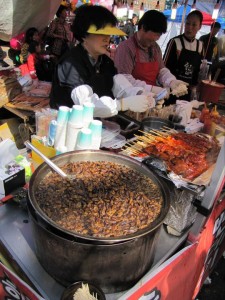
Bondeggi. Boiled silkworm larvae. Tastes even worse than it smells
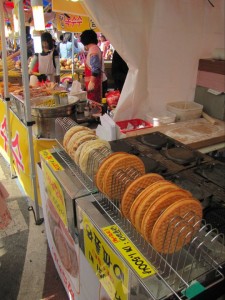
Smothered in faux cream, these waffles are pretty amazing.
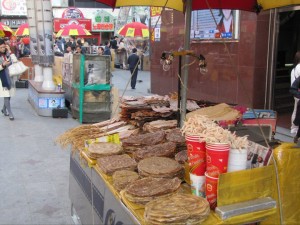
A variety of dried fish and other sea creatures. I'm particularly fond of dried squid.
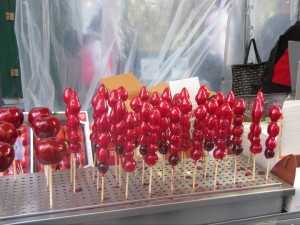
Toffee apples I've had. But toffee strawberries?
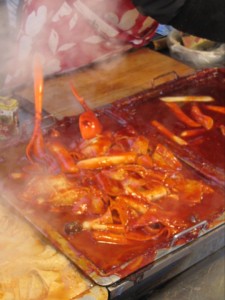
Chewy rice cake, processed fish, and a super spicy sauce make up ddokboki
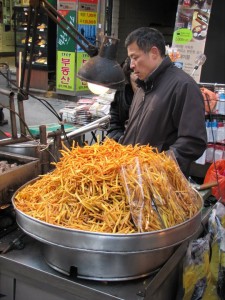
Sweet fries. My friend Anne calls them picnics, but I call them an abomination.
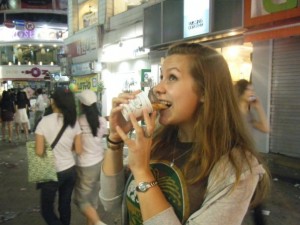
Enjoying some pizza in a cup in late 2009. A greasy delight.
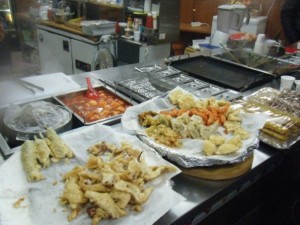
A variety of deep fried delights. Twigim is a personal favorite of mine when under the influence.
A special note on this last food, my personal favorite when I'm drunk and in need of greasy sustenance. Twigim comes in a variety of forms - but it's essentially something that has been battered and is then deep friend. You then eat it dipping it in some soy sauce. Squid, octopus, gimbap (see above), hard-boiled eggs, stuffed peppers, glass noodles, vegetables, and shrimp are just a few of the things I've had. Twigim's one drawback is that it's everywhere and can be very hit or miss. The best I ever had was at a nondescript tent between my old apartment and the post office - and the worst has been at a little storefront on the walk home from work at my current job.
Word to the wise - It does not reheat at all well. Eat it there or eat it fast, but don't let it go cold. It's just not cricket.
But there you have it. I'm not a food critic, so I'm going to let my brief descriptions and the pictures do it for you. But I've met people who have been here a year and never tried some of the above and I'm just shocked. Why travel halfway around the world to experience another culture if you're not going to just go crazy and embrace it? Sure, bondeggi tastes like ass - but I can put that alongside deep fried grasshopper as one of the stranger things I've eaten and be proud that I had the balls to do it.
The strangest thing I've ever eaten was a live sea cucumber, by the way. Picture a pulsing penis shaped thing resting on your tongue. You bite into it and first it's soft, but there's a hard core. It shoots something down your throat. You gag.
I now feel for every girl everywhere. I felt violated.
But that's another story.












 The controversial video game,
The controversial video game, 


 RSS Feed
RSS Feed












Recent comments